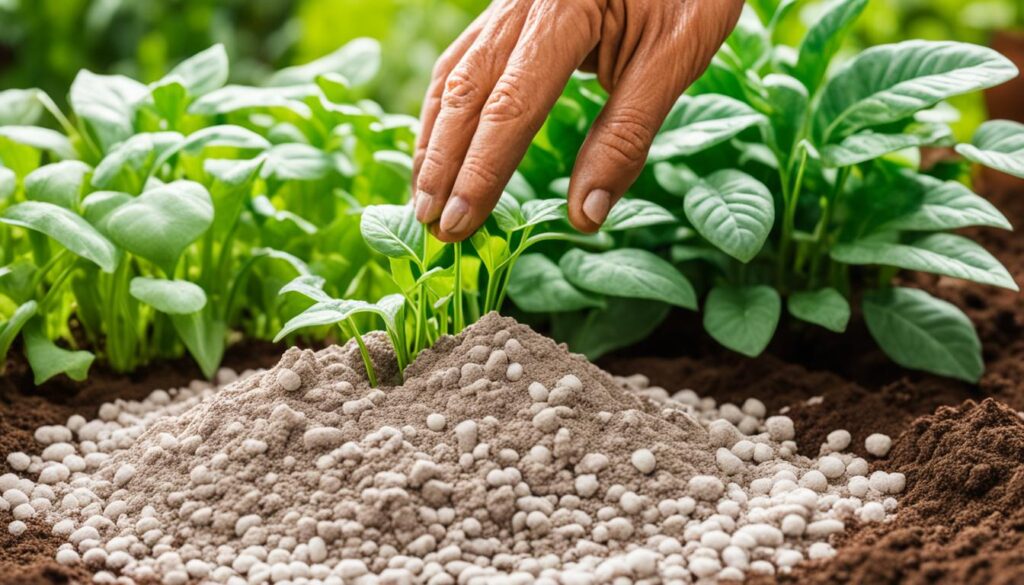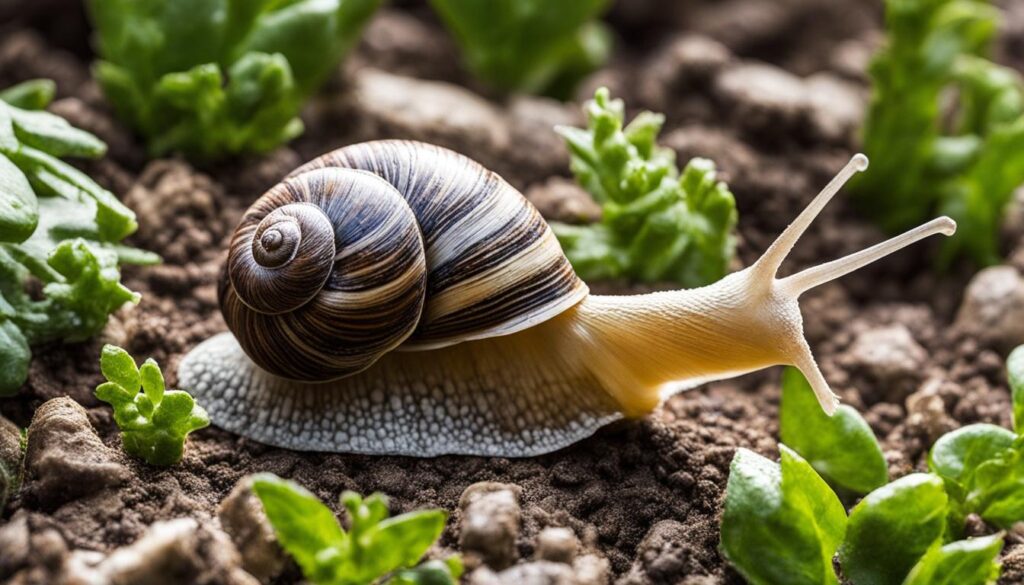Diatomaceous earth is a remarkable substance, offering a wide range of uses that can benefit various aspects of our lives. Whether you are looking for a natural pest control solution, striving to improve your garden, or seeking to harness the health benefits of this unique material, diatomaceous earth has you covered. In this article, I will guide you through the diverse applications of diatomaceous earth and provide valuable insights on how to use it effectively and safely.
Key Takeaways:
- Discover the versatility of diatomaceous earth and its numerous applications
- Learn how to use diatomaceous earth for effective pest control
- Explore the benefits of diatomaceous earth in gardening and soil improvement
- Uncover the potential health benefits of consuming food-grade diatomaceous earth
- Understand the importance of following safety precautions while using diatomaceous earth
Using Diatomaceous Earth for Pest Control
Diatomaceous earth is a natural and non-toxic solution for pest control. Its unique composition, made up of fossilized remains of microscopic algae called diatoms, makes it highly effective in eliminating pests like ants, beetles, and bed bugs.
When applying diatomaceous earth for pest control, it is important to follow the proper application instructions and safety precautions to ensure effectiveness and minimize any potential risks.
Application Instructions
To use diatomaceous earth for pest control, follow these steps:
- Identify the infested areas: Determine the specific areas where pests are present. This could include cracks, crevices, baseboards, and other hiding spots.
- Prepare the diatomaceous earth: Wear gloves and a mask to protect yourself from inhaling the fine particles. Mix the diatomaceous earth with water to form a paste or use it in its dry powder form.
- Apply the diatomaceous earth: Use a brush or sprinkle the diatomaceous earth directly onto the infested areas. Ensure thorough coverage to target the pests. For larger areas, a garden duster or sprayer can be used.
- Monitor and reapply if needed: Monitor the areas for pest activity and reapply the diatomaceous earth as necessary. Repeat the application process until the pests are eliminated.
Safety Precautions
While diatomaceous earth is generally safe for humans and pets when used as directed, it is important to take the following safety precautions:
- Protective gear: Always wear gloves and a mask when handling diatomaceous earth to avoid inhalation of fine particles.
- Keep away from eyes and mouth: Avoid contact with eyes and mucous membranes. If contact occurs, flush with water immediately.
- Avoid ingestion: Do not consume diatomaceous earth intended for pest control. If accidentally ingested, seek medical attention.
- Store properly: Keep diatomaceous earth in a dry, cool place away from children and pets. Follow the instructions on the packaging for proper storage.
Incorporating diatomaceous earth into your pest control routine offers a safe and effective alternative to chemical pesticides. By following the application instructions and safety precautions, you can control pests in your home without harming your family or the environment.
Using Diatomaceous Earth in the Garden
When it comes to gardening, diatomaceous earth is a versatile and effective tool that can help you achieve healthy and thriving plants. Not only does it provide an organic solution for pest control, but it also offers additional benefits for your garden soil.

Pest Control:
Diatomaceous earth is a natural and safe way to control common garden pests such as aphids, white flies, and spider mites. Sprinkle a thin layer of diatomaceous earth around your plants or directly on the leaves to create a barrier that will dehydrate and kill these pests, without harming beneficial insects like ladybugs and lacewings.
Soil Health:
In addition to pest control, diatomaceous earth can improve the health of your garden soil. Its porous and absorbent nature helps to retain moisture, prevent compaction, and promote better drainage. The silica content in diatomaceous earth also aids in the absorption of essential nutrients, making them more readily available to your plants.
Preventing Fungi and Mold:
Diatomaceous earth has the ability to absorb excess moisture, which helps to prevent the growth of fungi and mold in your garden. By applying diatomaceous earth around susceptible areas, such as the base of plants or in damp spots, you can create an inhospitable environment for these unwanted growths.
Safety Precautions:
While diatomaceous earth is safe for garden use, it is important to follow safety precautions to ensure its effectiveness and protect yourself. When applying diatomaceous earth, wear gloves to avoid skin irritation and use a dust mask to prevent inhalation of the fine particles. It is also best to apply diatomaceous earth on a calm day to prevent it from being blown away by wind.
Overall, diatomaceous earth is a valuable tool for any gardener, providing natural pest control benefits and improving soil health. By following proper application techniques and safety precautions, you can make the most of this organic solution for a thriving garden.
Diatomaceous Earth for Health Benefits
When it comes to health benefits, food-grade diatomaceous earth is a natural powerhouse. Consuming diatomaceous earth can improve digestion, aid in detoxification, and promote healthy hair, skin, and nails.
One of the key benefits of diatomaceous earth is its ability to improve digestive health. It acts as a gentle abrasive, helping to cleanse the digestive tract and promote regular bowel movements. It can also help with the absorption of nutrients, ensuring your body gets the maximum benefit from the food you eat.
Additionally, diatomaceous earth has detoxifying properties. It can help to remove heavy metals, bacteria, and parasites from the body, supporting overall detoxification processes. Regular consumption of diatomaceous earth can help to cleanse and purify your system.
When it comes to external benefits, diatomaceous earth can work wonders for your hair, skin, and nails. Its silica content promotes the growth of strong and healthy hair, while also improving skin elasticity and promoting a youthful complexion. It can also strengthen nails, making them less prone to breakage.
The Importance of Using Food Grade Diatomaceous Earth
When consuming diatomaceous earth for its health benefits, it’s crucial to use only food-grade diatomaceous earth. This type of diatomaceous earth is specifically processed and purified for human consumption. It is free from harmful impurities and is safe to use internally.
Using non-food grade diatomaceous earth can have adverse effects on your health. Non-food grade diatomaceous earth may contain high levels of crystalline silica, which can be harmful when ingested. To ensure your safety, always look for food-grade diatomaceous earth when using it as a dietary supplement.
Diatomaceous Earth Dosage and Possible Side Effects
When it comes to the dosage of diatomaceous earth, it’s important to follow the recommended guidelines. The dosage may vary depending on your desired health benefits and individual circumstances. It is advisable to start with a small dose and gradually increase it to avoid any potential side effects.
While diatomaceous earth is generally safe for consumption, some people may experience side effects. These side effects can include dry skin, mild respiratory irritation, and temporary digestive discomfort. If you experience any persistent or severe side effects, it is best to consult a healthcare professional.
To summarize, food-grade diatomaceous earth offers numerous health benefits, including improved digestion, detoxification, and enhanced hair, skin, and nail health. However, it is essential to use food-grade diatomaceous earth, follow the recommended dosage, and be aware of potential side effects.
Natural Ways to Get Rid of Aphids
Aphids can be a common problem in gardens, but there are natural ways to eliminate them without using harmful chemicals. These methods are not only effective but also safe for the environment and beneficial insects. In this section, I will discuss some natural remedies that can help you get rid of aphids in your garden.
1. Organic Aphid Spray
One of the simplest and most effective ways to control aphids is by making an organic spray using neem oil and pure castor soap. Neem oil acts as a natural insecticide, disrupting the aphids’ feeding and reproductive systems. Castor soap helps to wash away and suffocate aphids.
“Neem oil and castor soap are powerful natural ingredients that can effectively kill aphids and protect your plants from further infestation,” explains Dr. Emily Green, a renowned horticulturist.
You can make the aphid spray by mixing one teaspoon of neem oil and one tablespoon of pure castor soap in one liter of water. Stir well and transfer the solution to a spray bottle. Thoroughly spray the affected plants, focusing on the undersides of leaves where aphids tend to gather. Repeat the process every few days until the aphid population is under control.
2. Ladybugs and Lacewings
Another natural way to combat aphids is by introducing beneficial insects like ladybugs and lacewings into your garden. These insects are natural predators of aphids and can help keep their population in check. Ladybugs and lacewings can be purchased online or from garden centers.
“Ladybugs and lacewings are not only adorable, but they are also highly effective at controlling aphids. They will feast on the aphids and provide ongoing pest control in your garden,” recommends Dr. Benjamin Thompson, an entomologist.
To attract ladybugs and lacewings, plant pollen and nectar-rich flowers such as marigolds, daisies, and yarrow. Providing shallow dishes of water and creating sheltered areas, such as brush piles or insect hotels, will also encourage these beneficial insects to stay in your garden.
Using these natural methods, you can effectively control aphids in your garden without resorting to chemical pesticides. The organic spray and beneficial insects are safe for your plants, other insects, and the environment. By employing these natural strategies, you can maintain a healthy and thriving garden.
Controlling Ants Organically
Ants can be a nuisance in the garden, especially when they start farming aphids on plants. Fortunately, there are natural remedies that can help you control ants effectively and without the use of chemical pesticides. Two popular methods are using diatomaceous earth and cornmeal.
Using Diatomaceous Earth
Diatomaceous earth is a powdery substance made from the fossilized remains of diatoms, a type of algae. It is an effective natural solution for controlling ants and other crawling insects.
To use diatomaceous earth for ant control, simply sprinkle a thin layer of the powder around anthills and areas where ants are present. The fine particles of diatomaceous earth will stick to the ants’ bodies, causing them to dehydrate and die.
Using Cornmeal
Cornmeal is another natural remedy that can help you get rid of ants. Ants cannot digest cornmeal, so when they consume it, it expands in their digestive systems and ultimately leads to their demise.
To use cornmeal for ant control, sprinkle it in areas where ants are active or near their entry points. The ants will be attracted to the cornmeal and carry it back to their colony, eventually causing the entire colony to perish.
Both diatomaceous earth and cornmeal are safe to use around plants, pets, and children. However, it’s important to note that these natural remedies may take some time to fully eliminate an ant infestation, so patience and consistency are key.
| Diatomaceous Earth | Cornmeal |
|---|---|
| Effective in controlling ants and other crawling insects | Ants cannot digest cornmeal, leading to their demise |
| Safe to use around plants, pets, and children | Safe to use around plants, pets, and children |
| Requires patience and consistency | May take time to fully eliminate an ant infestation |
By utilizing these natural remedies, you can effectively control ants in your garden and maintain a pest-free environment without relying on harmful chemicals. Remember to reapply as needed and monitor the ant activity to ensure that the infestation is successfully eliminated.
Combatting Squash Bugs with Diatomaceous Earth
Squash bugs can wreak havoc on your plants, causing significant damage to your squash, cucumbers, and melons. However, there is a natural and effective solution that can help you eliminate these pesky bugs: diatomaceous earth.
Diatomaceous earth is a fine powder made from the fossilized remains of diatoms, microscopic algae-like organisms. It is safe for humans and pets but deadly for insects. When the bugs come into contact with diatomaceous earth, it dehydrates and damages their outer layer, ultimately causing their demise.
To use diatomaceous earth for squash bug control, follow these simple steps:
- Identify the affected plants. Look for the presence of eggs, nymphs (young bugs), and adult squash bugs.
- Wear protective gloves to avoid direct contact with the powder.
- Apply diatomaceous earth directly on the leaves, stems, and around the base of the plants.
- Make sure to cover both the upper and lower surfaces of the leaves, as squash bugs tend to feed on the underside.
- Reapply the powder after rain or heavy watering, as it may get washed away.
Keep in mind that diatomaceous earth works best when it is dry, so avoid applying it during wet or humid conditions. For optimal results, repeat the application every week or as needed until the squash bug population is under control.
Note: Diatomaceous earth is a mechanical insecticide and does not discriminate between beneficial insects and pests. Use it selectively and sparingly to minimize any potential impact on beneficial insects in your garden.
Other Methods for Managing Squash Bugs
While diatomaceous earth is an effective tool, there are additional methods you can employ to combat squash bugs.
- Vacuuming: Use a handheld vacuum cleaner to physically remove squash bugs from the plants. This method is especially useful for early detection and control.
- Chickens: Consider keeping a small flock of chickens in your garden. They love to eat insects and can help manage squash bug populations.
By combining these methods, you can effectively control squash bugs and protect your precious squash and other cucurbit plants from their destructive feeding.

Eliminating Cabbage Worms with Natural Sprays
Cabbage worms can wreak havoc on your garden, especially if you’re growing cabbage, broccoli, or cauliflower. These pests can quickly devour your plants, leaving you disappointed and frustrated. But don’t worry, there are natural solutions to effectively eliminate cabbage worms without harming beneficial insects in your garden.
Two popular and effective options for controlling cabbage worms are BT spray and spinosad spray. These natural sprays specifically target cabbage worms and caterpillars, providing an environmentally friendly way to protect your plants.
BT spray, short for bacillus thuringiensis, is a natural bacteria that targets specific pests, like cabbage worms. When the cabbage worms ingest BT spray, it releases toxins in their digestive systems, eventually killing them. This spray is safe for humans, pets, and beneficial insects, making it an excellent choice for organic gardeners.
Similarly, spinosad spray is another natural and effective solution for cabbage worm control. Spinosad is derived from a soil bacterium and works by affecting the insect’s nervous system, causing paralysis and eventually leading to their demise. Like BT spray, spinosad spray is safe for beneficial insects.
To ensure the effectiveness of these sprays against cabbage worms, it is crucial to follow the instructions carefully. Each product may have different application rates and timing, so be sure to read and adhere to the product labels. Additionally, it is best to spray in the early morning or late evening when the cabbage worms are more active.
By using BT spray or spinosad spray, you can effectively control cabbage worms and protect your cabbage, broccoli, and cauliflower plants. These natural sprays allow you to maintain a healthy garden while keeping harmful chemicals at bay.
Remember, organic pest control takes time and patience. Regular monitoring and timely spraying can help keep cabbage worms under control. Combine these sprays with other natural pest control methods, such as row covers or handpicking, for even better results.
Using BT spray and spinosad spray against cabbage worms in your garden can help protect your plants and ensure a bountiful harvest. By choosing natural and environmentally friendly solutions, you can maintain a healthy garden ecosystem while enjoying the fruits of your labor.
Repelling Snails and Slugs in the Garden
Snails and slugs can wreak havoc on your garden, munching away on your precious plants. But fear not, there are organic methods to repel these slimy intruders and protect your garden bounty. Let’s explore two effective strategies: crushed eggshells and beer traps.
Eggshells: A Natural Deterrent
Did you know that snails and slugs have an aversion to rough and sharp surfaces? By creating a barrier of crushed eggshells around your plants, you can discourage these pests from venturing any further.
To use this method:
- Save and rinse eggshells after cooking or baking.
- Dry the eggshells thoroughly.
- Crush the eggshells into small pieces.
- Spread the crushed eggshells around the base of your plants, creating a protective ring.
Not only does this natural technique help repel snails and slugs, but it also enriches your soil with calcium, benefiting your plants’ growth.
Beer Traps: Luring the Pests
If you prefer a more hands-on approach to dealing with snails and slugs, consider setting up beer traps.
To use this method:
- Choose a container like a shallow dish or a small jar.
- Place the container at ground level near the affected plants.
- Pour some beer into the container, enough to submerge the rim by about an inch.
- The scent of the beer will attract snails and slugs.
- They will crawl in and drown in the beer.
- Check the traps regularly and empty them as needed.
Remember to use cheap beer, as snails and slugs are not particular about the brand.
Tip: To increase the effectiveness of beer traps, position them in areas where snails and slugs are most prevalent, such as near shaded or damp areas of your garden.
Repelling with Spoiled Milk
Another method to repel snails and slugs is using spoiled milk. These garden pests detest the scent of spoiled milk, making it an effective and natural deterrent.
To use this method:
- Allow milk to spoil by leaving it uncovered in a warm place for a few days.
- Once the milk has a strong odor, dilute it with water in a ratio of 1 part spoiled milk to 10 parts water.
- Pour the diluted mixture into a spray bottle.
- Thoroughly mist the affected plants, focusing on the leaves and stems.
- Reapply the mixture after rainfall or every few days to maintain its effectiveness.
Caution: While using spoiled milk can be an effective deterrent, it’s important to exercise caution when using dairy products in the garden. Make sure to use only spoiled milk and avoid using fresh milk, which can attract unwanted pests.
By incorporating these organic methods into your gardening routine, you can keep snails and slugs at bay without relying on harmful pesticides. Enjoy a thriving garden, free from these garden pests.
| Organic Method | Pros | Cons |
|---|---|---|
| Crushed Eggshells | – Natural deterrent | – Requires regular replenishment |
| Beer Traps | – Easy to set up | – May attract other insects |
| Spoiled Milk | – Effective in repelling snails and slugs | – Dairy product usage precautions |

Encouraging Beneficial Insects in the Garden
Creating a garden that attracts beneficial insects is key to maintaining a healthy ecosystem and reducing the need for chemical pesticides. Ladybugs and lacewings are two examples of beneficial insects that can control pests naturally. To encourage these helpful creatures, I recommend planting a diverse selection of flowers in your garden. Flowers such as marigolds, daisies, and lavender are known to attract ladybugs and lacewings with their vibrant colors and enticing scents.
In addition to providing food sources, it is essential to offer water for these insects. Place a shallow dish or container filled with clean water in your garden. This will not only provide a much-needed hydration source but also serve as a place for these insects to reproduce and thrive.
By creating an environment that is attractive to beneficial insects, you can establish a natural pest control system in your garden. Ladybugs and lacewings will feed on destructive pests like aphids, caterpillars, and mites, keeping their populations in check. This, in turn, helps to maintain the health and balance of your garden without relying on harmful chemicals.
FAQ
How can I use diatomaceous earth for pest control?
Diatomaceous earth can be applied to areas infested with insects, such as ants, beetles, and bed bugs. Follow the application instructions and safety precautions to avoid adverse effects, and use the correct dosage for effective pest control.
How can I use diatomaceous earth in the garden?
Diatomaceous earth can be used to control pests like aphids, white flies, and spider mites in the garden. It can also improve soil health and prevent the growth of fungi and mold. However, make sure to follow safety precautions when applying diatomaceous earth in the garden.
What are the health benefits of food-grade diatomaceous earth?
Food-grade diatomaceous earth can improve digestive health, promote detoxification, and support healthy hair, skin, and nails when consumed. However, it is important to use food-grade diatomaceous earth and follow the recommended dosage to avoid potential side effects.
Are there natural ways to get rid of aphids?
Yes, there are natural ways to eliminate aphids without using harmful chemicals. You can mix neem oil and pure castor soap with water to create an organic spray that effectively kills aphids. Introducing ladybugs and lacewings as natural predators of aphids can also help control their population in the garden.
How can I control ants organically?
To control ants organically, you can sprinkle diatomaceous earth around anthills, as it acts as a natural deterrent. Another effective method is using cornmeal, as ants cannot digest it. These natural remedies are safe and effective alternatives to chemical pesticides.
How can I combat squash bugs with diatomaceous earth?
Sprinkling diatomaceous earth directly on the plants can dehydrate and kill squash bugs, protecting the plants. Additionally, vacuuming and using chickens as bug control methods can help manage squash bug populations in the garden.
What natural sprays can eliminate cabbage worms?
BT (bacillus thuringiensis) and spinosad sprays are effective in eliminating cabbage worms and caterpillars without harming beneficial insects. Make sure to spray at the right time and follow the instructions for proper application.
How can I repel snails and slugs in the garden?
Crushed eggshells can deter snails and slugs in the garden, and setting up beer traps can attract and drown them. Spoiled milk can also repel these pests, but be cautious when using dairy products in the garden.
How can I encourage beneficial insects in the garden?
Planting flowers and providing water sources can create a welcoming environment for beneficial insects like ladybugs and lacewings in the garden. These insects play a crucial role in naturally controlling pests, reducing the need for chemical pesticides.






